Don't wanna be here? Send us removal request.
Text
Blog 6 - Personal Collage
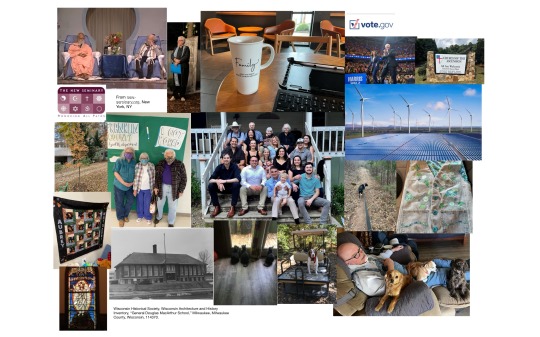
My father died on April 16, 2023. The center photo is taken of the family after the memorial service we had at the state park near our house. The tree to the left of center was planted on our property on top of his ashes. He is the man pictured just left of the family photo. I was ordained at the New Seminary in New York as an interfaith minister in 1999. I do not practice much as a minister except for things like my dad’s memorial service, and a few weddings, but its principles guide my life. Rabbi Geldermann, pictured top left, always said, “Never instead of, always in addition to” the religion in which we were born. After ordination, I started attending the Episcopal church and continue to do so to this day. Next to my relationship with God, I center my life on my family, including our many pets.
7 notes
·
View notes
Text
Blog 5 - TCM, Power Centers, and My Weight
”The weight [is] a side effect of the imbalance in [your] power centers, the real culprit behind [your] illness” (Ting and Jas 171).
Instead of looking at excess weight as the problem, Chinese medicine views it as an indication of an imbalance in your system. Your body is trying to talk to you, communicate its needs and its desire to reset your imbalance and return you to health, or homeostasis.
In 2001, I had a total hysterectomy because I had a 7 pound fibroid. Yes, you read that right! It was the size of a volleyball. In 2002, I had my thyroid removed because it was encased in scar tissue. Needless to say, this threw my whole body out of balance. I began to gain weight for the first time in my life. I have not lost it since then. My endocrine system is severely compromised.
Chinese medicine does not view the body in systems like allopathic medicine. Instead, it focuses on power centers. These power centers, identified by an organ, correspond to the five elements, to the five seasons, and to the five emotions.
Organ-->Element-->Season-->Emotion
Heart --> Fire-->Summer-->Joy
Spleen-->Earth-->Late Summer-->Worry
Lungs-->Metal-->Autumn-->Sadness
Kidney-->Water-->Winter-->Fear
Liver-->Wood-->Spring-->Anger
All of these are interconnected, influencing each other.
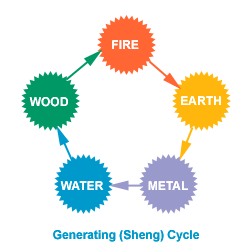
The five organs also correspond to five colors as illustrated above. Shen is spirit and can be interpreted as enthusiasm or yang energy.
Learning about Chinese medicine has proven to be challenging and interesting. Because of my spleen or pancreas-stomach deficiency, I have to cook everything. I still walk into the kitchen and wonder what I can eat. Grabbing something to eat quickly does not exist. Going out to eat offers an even bigger challenge, unless I go to a Japanese restaurant, order everything without sauce, and bring my own tamari. Chinese food is often cooked with soy sauce. (Soy sauce has wheat in it. I am gluten sensitive.) I am not sure how effective eating this way is for improving my health, but I have read where improving the pancreas-stomach deficiency can take time. When all attempts at control fail, the only thing left to do is to surrender to something greater than myself.
This photo of my great-grandson reminds me of a Beatles song: "When I find myself in times of trouble/ Mother Mary comes to me/ speaking words of wisdom/ Let it be." (I used to have such a crush on Paul McCartney when I was a kid.)
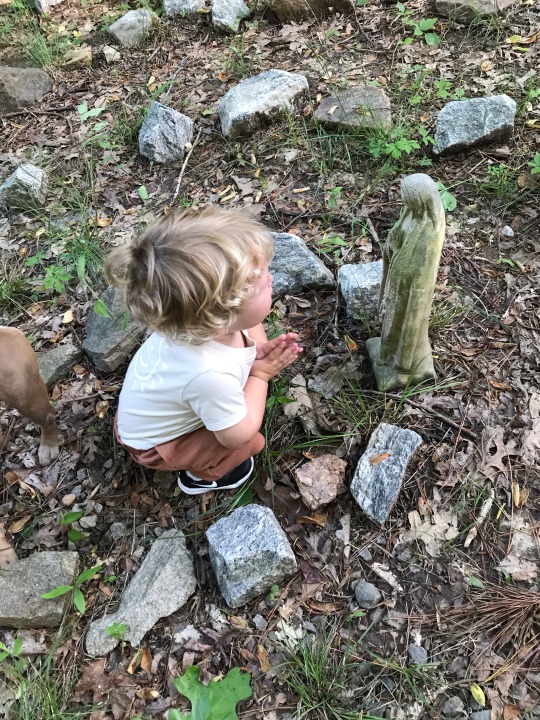
Works Cited
Ting, Esther and Marianne Jas. Total Health the Chinese Way: An Essential Guide to Easing Pain, Reducing Stress, Treating Illness, and Restoring the Body through. DaCapo Lifelong Books, 2009.
8 notes
·
View notes
Text
Blog 4 - Chinese Medicine & Mindful Eating
As I enter my fourth week on this journey into Chinese medicine and food, I am facing more challenges. First, I discovered I can no longer eat eggs. After having another bout of gastritis, I traced it back to eggs. At this rate, I will end up not having much I can eat! I have ordered a book on allergies and retraining the brain, but that is another topic for another day.
Anyway, another area of Chinese medicine that I need to incorporate in my life revolves around how I eat. Chinese medicine practitioners stress mindful eating. I tend to do distracted eating in front of the television, except for our main meal that I usually eat at the dining table with my husband. From the Chinese medicine perspective, distracted eating contributes to my digestive problems.
I do not enjoy eating at a table, unless I am eating in a restaurant.
As a kid, my parents, my brother, and I sat down to eat supper at a drop-leaf table in our narrow kitchen. My father reigned from one narrow side of the table while my mother sat opposite from him. My brother and I sat together on the long edge. Tension was served along with the food. My father’s anger often permeated the atmosphere like a low-hanging gray cloud. Sitting next to my brother, the first bully in my life, increased the tension.
Despite my past relationship with eating and sitting at a kitchen table, I am willing to start to eat mindfully. Katy Tapper from the Department of Psychology at the University of London authored an extensive article called “Mindful eating: what we know so far.”[1] She points out that studies on mindful eating and its health benefits prove to inconclusive (Tapper 173). Measuring mindful eating has proven to be confusing. My conclusion—it cannot hurt!
I am trying to eat our main meal mindfully. However, my husband does not. He still gobbles down his food. Life seems to offer so many opportunities to stay true to ourselves despite the choices others make!
Maybe I need to learn some lessons from the deer eating in our front yard . . . .
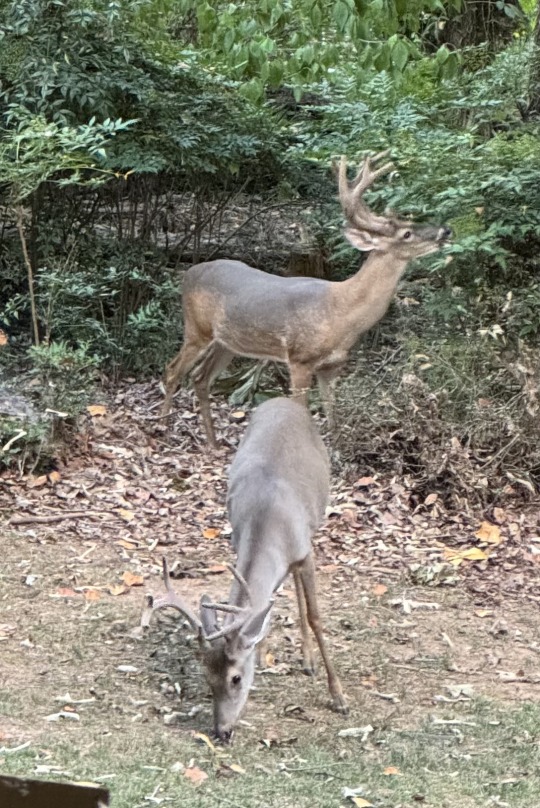
Works Cited
Tapper, Katy. “Mindful Eating: What We Know so Far.” Nutrition Bulletin, vol. 47, no. 2, June 2022, pp. 168–85. EBSCOhost, https://doi.org/10.1111/nbu.12559.
12 notes
·
View notes
Text
Blog 3: Chinese Medicine, the 5 Elements & Me
In the previous blog, I touched on the yin and yang properties emphasized in Chinese medicine. The ancient Chinese sages also viewed the world in terms of a system of Five Elements: wood, fire, earth, metal, and water. These elements interact with each other and are found within all life, including our bodies.
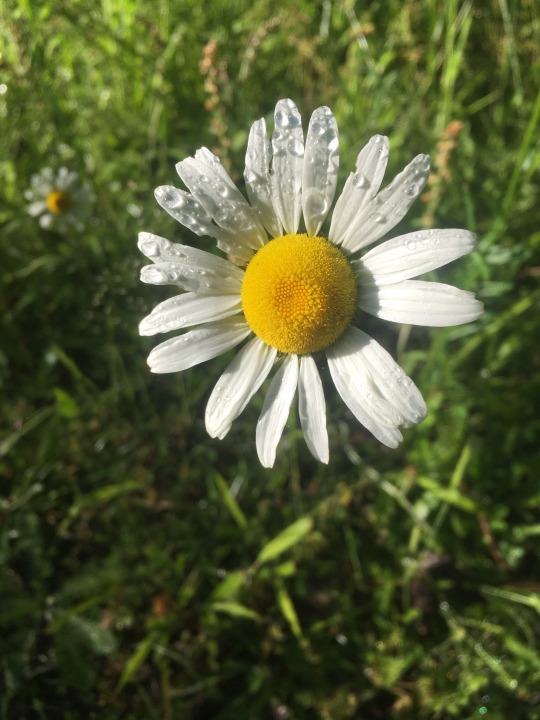
Marie Hopkinson, a Chinese medicine practitioner in Australia, used the analogy of a plant to explain how these elements interact. The sun contributes fire to the plant, urging it to grow upward. The earth grounds the plant, allowing it to absorb nutrients. Metal refers to the wind and air, giving the plant oxygen. Also, the plant needs water to grow. If any of these elements get out of balance, the plant will not thrive. (To watch her video, follow link listed below to her video, "Why eat mostly cooked foods.)
I have been diagnosed by my acupuncturist as having dampness in my spleen, known as spleen energy deficiency, or spleen qi deficiency. The spleen-pancreas system, which is more of a functional term than a reference to these biological organs, is governed by the earth element. (To learn more about dampness in Chinese medicine, follow the link listed below to her video, "What is Dampness.)

Summer corresponds to the earth element because of its dampness. I have a particularly tough time with summer's humidity because I am allergic to molds, particularly leaf molds. Since we live in the woods, and not far from a large lake, I have to stay in the house with air filters on to get away from leaf mold.
Someone like me with a spleen-pancreas imbalance will suffer with chronic tiredness, a weak digestion, and many other issues. Imagine a plant that has been over-watered, sagging with yellow leaves and not growing as it should.
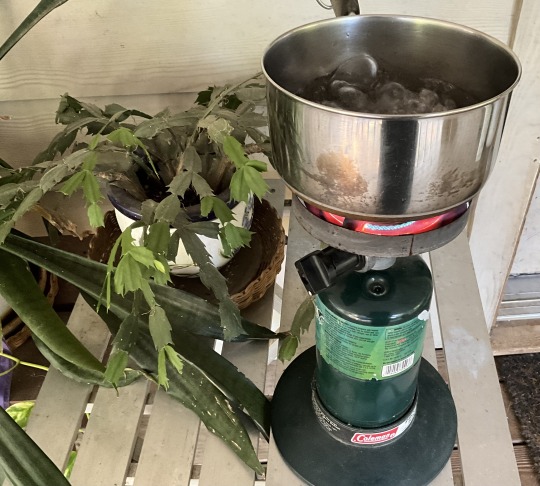
To understand the spleen-pancreas system's function, imagine a fire (the spleen) heating up a pot of fluids (the stomach). The stomach needs warm, moist, cooked foods so it does not have to overwork while getting the nutrients of the foods. If the fires of the spleen system has been depleted, like mine has, cold foods make it work too hard.
To gain energy, those with spleen energy deficiency will crave sweets. To supply this energy in a healthy way, not overloading the body with glucose which we all know creates a rollercoaster of sugar highs and lows, Chinese medicine recommends eating grains, especially rice, and some fruit, with plenty of vegetables. Fried foods, refined foods, dairy products and dampening fruits and vegetables should be limited.
Many of these changes have challenged me. As I mentioned in my previous blog, Total Health gave me a convenient table that categorizes food as drying, lubricating, neutral, and strengthening. Since not every practitioner agrees with what foods fit in what categories, I have chosen to follow Ting's advice. I use Pitchford's book as a reference. He provides in-depth descriptions of the various properties of foods along with information on what conditions they treat.

Unlike my mother, I do not excel in menu planning. When I was young, my brother and I were not allowed to just grab something to eat because my mother was probably planning to use it for a specific meal. My biggest challenge has been figuring out what to eat using Chinese medicine recommendations.
I found a recipe in Total Healing called "Morning Energy Mega Boost" that satisfies my desire for sweets in the morning. It contains oatmeal, protein powder, walnuts, black sesame seeds, bee pollen, figs, apricots, and dates. My stomach and my taste buds like it.
Having soup or rice congee, a soupy rice mixture, works for supper. Chinese medicine also recommends eating light in the evening, which I was already doing because the result is that I have less acid reflux at night.
This leaves the biggest dilemma--what to eat for our main meal. Chinese medicine recommends eating your main meal in the middle of the day. We have been doing that for quite some time because of my husband's work schedule. Pitchford recommends eating only a small amount of meat, but my husband and I have been eating meat all of our lives. I have yet to find many recipes that work for me, other than stir fries, because we have always centered our main meal around meat!
Open for suggestions!
Sources
Book References with links to them on Amazon:
Goldsmith, Ellen and Maya Klein. Nutritional Healing with Chinese Medicine. Robert Rose, 2017.
Pitchford, Paul. Healing with Whole Foods: Asian Traditions and Modern Nutrition. North Atlantic Books, 2002.
Ting, Esther and Marianne Jas. Total Health the Chinese Way: An Essential Guide to Easing Pain, Reducing Stress, Treating Illness, and Restoring the Body through. DaCapo Lifelong Books, 2009.
YouTube videos:
"What is Dampness? The Chinese Medicine Podcast with Marie Hopkinson," YouTube, uploaded by Chinese Medicine Podcast, 9 Jan. 2019, https://youtu.be/4u3N-N4kDMg?si=yBSL3E07DjuqJiRr.
"Why eat mostly cooked foods? The Chinese Medicine Podcast with Marie Hopkinson," YouTube, uploaded by Chinese Medicine Podcast, 13 Jul. 2071, https://youtu.be/hXprIWs1xeg?si=pX6v3nHphcfv4UJ2.
2 notes
·
View notes
Text
Blog 2: Chinese Medicine, Its Complexity, and Me
Look deep into nature, and then you will understand everything better.
Albert Einstein
A view from our front porch:
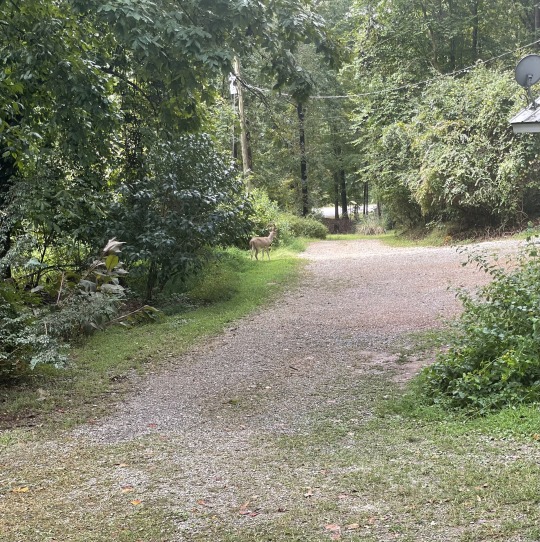
Trying to change my perspective and eating patterns to follow Traditional Chinese medicine’s (TCM's) recommendations has proven to be difficult. I consulted several sources. When I got down to specifics, like what to specifically eat or not eat, not all the sources agreed.
My husband hates change. He eats differently than I do already, but I do the shopping and cook our main meal. However, he always cautions me about making too many changes too quickly. After being married almost 36 years, he does know me fairly well! So . . .
Easy Does It
and
Keep It Simple
Chinese Medicine Simplified
Chinese medicine’s complexity far exceeds the limitations of this blog, but I will try and provide a simplified overview of it.
From the perspective of Chinese medicine, everything is interdependent and comes from the flow of qi, or energy. To be healthy, we must keep a dynamic state of balance in our bodies, living in harmony with ourselves, others, and all of nature.

The familiar tajii, or Yang/Yin symbol, illustrates this dynamic balance. Yang energy, the white area, motivates, energizes, and embodies qi. Yin energy, the black area, cools, moistens, nourishes, and anchors our shen, or spirit. These intertwined energies are found in every living thing.
Food is medicine.
Food is not just something with calories, vitamins, minerals, protein, carbs, and fat content. Every food has a thermal energy, the qi of food, that affects our internal balance of yin and yang. All food is categorized according to its thermal energy which can range from cold to hot. Warming foods have a yang action while cooling foods are yin acting. Yang foods cause ascending energy while Yin foods cause descending energy.
Chinese medicine also considers a food’s flavor as therapeutic. Sweet and pungent foods have a yang action. Salty, sour, and bitter foods bring about yin energy. Foods can be drying, lubricating, neutral, or strengthening.
Learning More About TCM and Foods
I consulted three books about food and TCM.
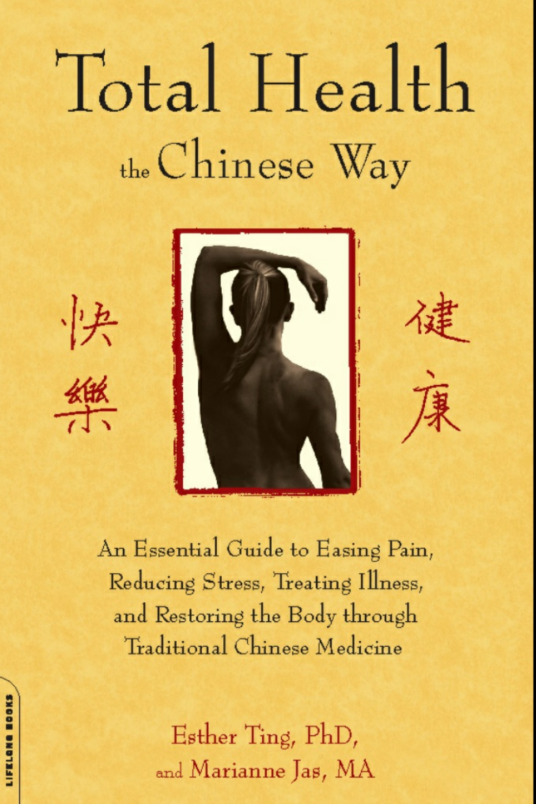
The first book I consulted was Total Health the Chinese Way: An Essential Guide to Eating by Esther Tin and Marian Jas. She has a nice table of foods organized by their thermal properties and another table matching the thermal properties to symptoms. Its simplicity makes it handy to look at when menu planning and grocery shopping. They also have included a questionnaire to determine your body temperature and energy level. I was somewhat confused by my results since I have symptoms in several areas. (More on this in my next blog.) In my opinion, this book ranks the highest for ease of understanding.
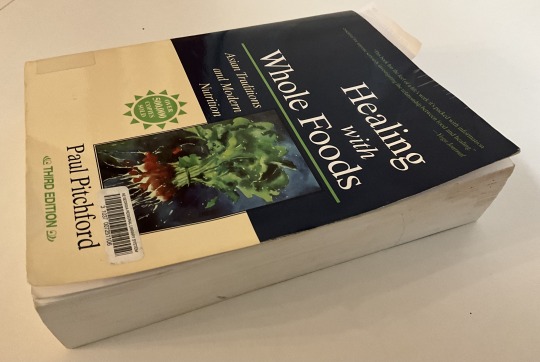
For extensive descriptions of foods and their properties and much more information on TCM, Paul Pitchford has written over 600 pages of information. I ended up using the index to figure out what would work for me since reading everything was overwhelming. If I want to know the properties of a food and what it is recommended for, this book tops all others. The PINES library system has this book, but after reading parts of it, I ordered a copy for myself. This books does not use the motto, "Easy Does It," but it did help me clarify the direction I need to take to heal my infirmities. I checked out my conclusion with my acupuncturist at my first visit. She confirmed that my conclusion was right.
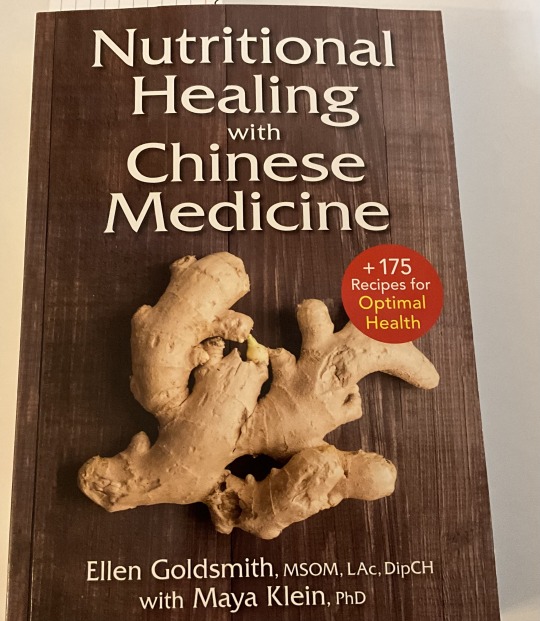
Goldsmith and Klein also write about TCM so anyone can understand it. I bought the book for the recipes but she uses many Chinese ingredients that are not available in rural northeast Georgia. Plus, her recipes are somewhat complicated. I use the motto "Keep it simple" in the kitchen!
To find out how I applied this to my health challenges, be sure and read my next blog.
Book References with links to them on Amazon:
Goldsmith, Ellen and Maya Klein. Nutritional Healing with Chinese Medicine. Robert Rose, 2017.
Pitchford, Paul. Healing with Whole Foods: Asian Traditions and Modern Nutrition. North Atlantic Books, 2002.
Ting, Esther and Marianne Jas. Total Health the Chinese Way: An Essential Guide to Easing Pain, Reducing Stress, Treating Illness, and Restoring the Body through. DaCapo Lifelong Books, 2009.
9 notes
·
View notes
Text
Blog 1: Chinese Medicine, Me & Food
“A chronic illness turns the patient into a good doctor.”
Chinese proverb
My Experience with traditional Western Medicine
In 2001, I had a complete hysterectomy because I had a seven-pound uterine fibroid. Then in 2002, a needle biopsy of my thyroid was too encased in scar tissue to get an exact diagnosis of the cause of my many symptoms. I had a total thyroidectomy, revealing that I had Hashimoto’s Disease. That surgery, along with thyroid medication, is supposed to end the Hashimoto’s symptoms, but it has not. Getting doctors to believe this to be true proves to be problematic. Their solutions come with risks and side effects I am unwilling to endure.
My Journey
Years of living with digestive issues and other “weird” symptoms has led me to researching and trying measures beyond traditional Western medicine. Therefore, I have been on a journey to become my own health advocate. I have read plenty of articles written by functional medicine practitioners as well as research results from scientific journals.
Over 40 years ago, I gave up alcohol and other mind- or mood-altering drugs. 30 years ago, I gave up coffee and switched to tea. About 15 years ago, I gave up gluten. A couple of years ago, I gave up dairy products other than fermented ones. I have several food and airborne allergies. I have lived on a personalized version of Autoimmune Paleo diet (AIP) for many years.
Where I am at Now
I have had periods of no digestive problems throughout these years. But they are back along with other unhealthy symptoms. Frankly, I am tired of giving stuff up! Since I have had success with acupuncture in the past, I decided to try a more comprehensive Chinese medicine approach. I have an upcoming appointment with an acupuncturist and met with her about Chinese medicine herbal remedies. She gave me many references to consult.
What I Will Share with You
I am going to take a Chinese medicine approach to my relationship to food. As I explore this path, I will share with you what I learn, what obstacles I encounter, and what appears to be working.
Please join me.
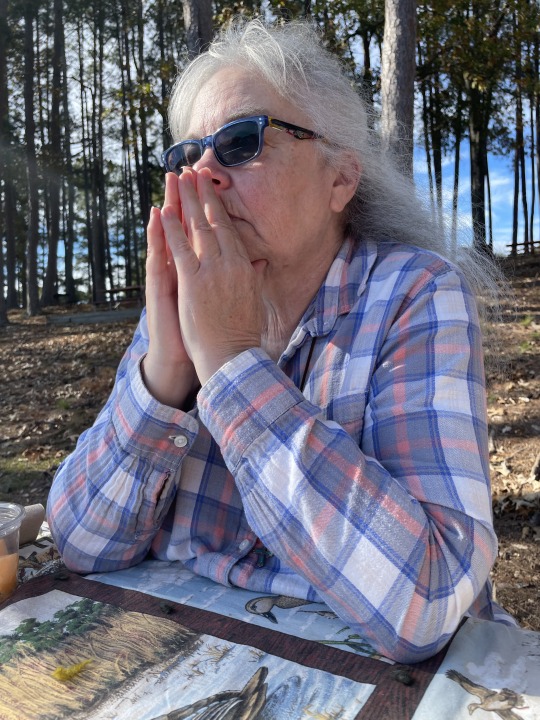
8 notes
·
View notes